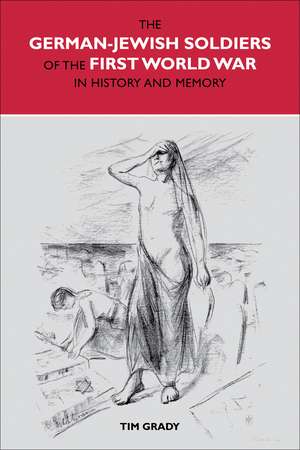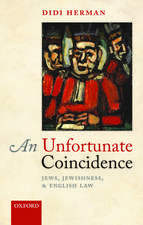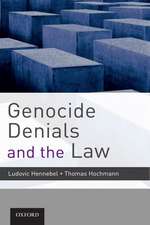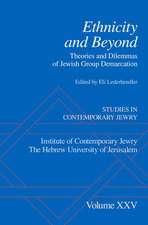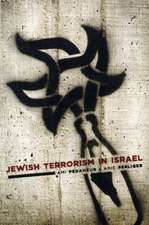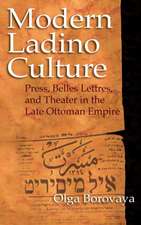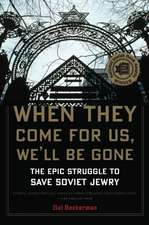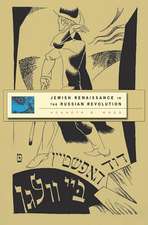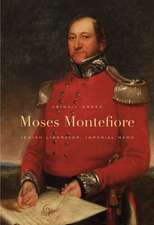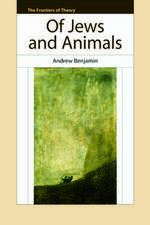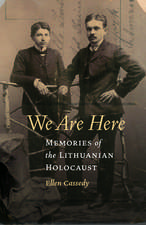The German–Jewish Soldiers of the First World War in History and Memory
Autor Tim Gradyen Limba Engleză Paperback – 31 iul 2012
Nearly one hundred thousand German Jews fought in World War I, and some twelve thousand of these soldiers lost their lives in battle. This book focuses on the multifaceted ways in which these soldiers have been remembered, as well as forgotten, from 1914 to the late 1970s. By examining Germany’s complex and continually evolving memory culture, Tim Grady opens up a new approach to the study of German and German-Jewish history. In doing so, he draws out a narrative of entangled and overlapping relations between Jews and non-Jews, a story that extends past the Holocaust and into the Cold War.
Preț: 373.96 lei
Nou
Puncte Express: 561
Preț estimativ în valută:
71.56€ • 74.91$ • 59.21£
71.56€ • 74.91$ • 59.21£
Carte tipărită la comandă
Livrare economică 07-21 aprilie
Preluare comenzi: 021 569.72.76
Specificații
ISBN-13: 9781846318511
ISBN-10: 1846318513
Pagini: 260
Ilustrații: 17 black & white illustrations
Dimensiuni: 156 x 234 x 15 mm
Greutate: 0.43 kg
Editura: Liverpool University Press
ISBN-10: 1846318513
Pagini: 260
Ilustrații: 17 black & white illustrations
Dimensiuni: 156 x 234 x 15 mm
Greutate: 0.43 kg
Editura: Liverpool University Press
Cuprins
List of Illustrations
Acknowledgements
List of Abbreviations
Acknowledgements
List of Abbreviations
Introduction
1. Dying: War, Mutilation and Mass Death, 1914–18
2. Mourning: Defeat, Revolution and Memorialisation, 1918–23
3. Commemorating: War Veterans, Ritual and Remembrance, 1923–29
4. Forgetting: Nazism, Front Fighters and Destruction, 1929–45
5. Discovering: War Victims, War Crimes and Reconstruction, 1945–60
6. Embracing: The Growth of Holocaust Awareness and Acknowledgement of the Jewish Soldiers, 1960–80
Conclusion
Bibliography
Index
Recenzii
“Tim Grady explores the ways in which Germans, both Jewish and non-Jewish, have commemorated these veterans and their fallen comrades from the end of hostilities in 1918 to the late 1970s. He argues that Jews played a central role in constituting Germany’s public memory of the First World War, and the strength of Grady’s book—his research ranges impressively from the archives of Berlin and Hamburg to those of Würzburg and Heilbronn—lies in its scenes of lingering attachment on the part of German Jews to their and their loved ones’ records of service, even after 1933….In addition to documenting this dedicated memory preservation, Grady’s study makes interesting points about the West German state’s early invocation of the Jews’ First World War service as a means of addressing their later persecution, and his book also reveals important debates between veterans and others in the Jewish community.”
“This admirably researched book seeks to revise what its author thinks is a distortion of German-Jewish history….The author also holds the Holocaust as responsible for the tendency to see WW I and its aftermath as the origin of genocide, instead of as an ongoing participation of Jews in German history….An interesting subject, well treated….Highly recommended.”
Notă biografică
Tim Grady is a senior lecturer in European history at the University of Chester and an honorary fellow at the Parkes Institute for Jewish / non-Jewish Relations at the University of Southampton.
